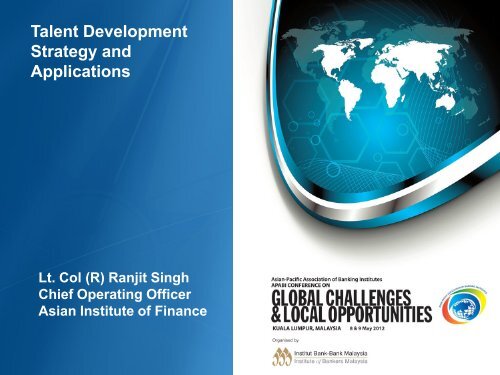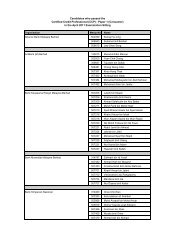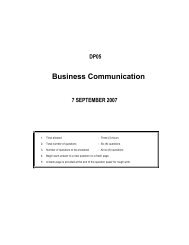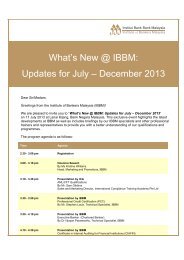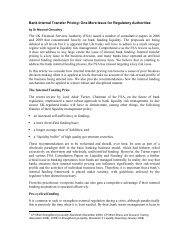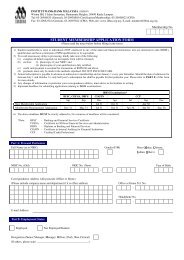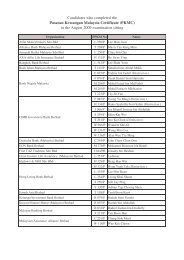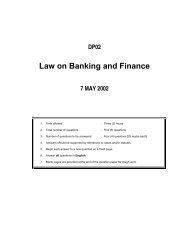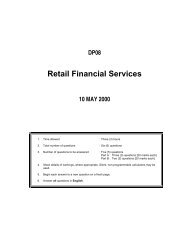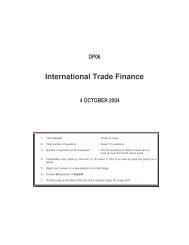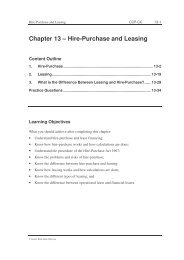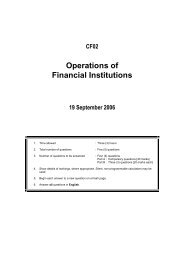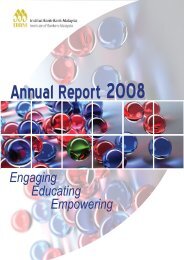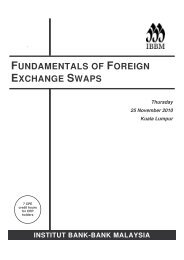Lt Col (R) Ranjit Singh, Chief Operating Officer, Asian Institute of ...
Lt Col (R) Ranjit Singh, Chief Operating Officer, Asian Institute of ...
Lt Col (R) Ranjit Singh, Chief Operating Officer, Asian Institute of ...
Create successful ePaper yourself
Turn your PDF publications into a flip-book with our unique Google optimized e-Paper software.
Talent DevelopmentStrategy andApplications<strong>Lt</strong>. <strong>Col</strong> (R) <strong>Ranjit</strong> <strong>Singh</strong><strong>Chief</strong> <strong>Operating</strong> <strong>Officer</strong><strong>Asian</strong> <strong>Institute</strong> <strong>of</strong> Finance
ScopeMalaysia’s Finance Industry - Towards 2020Issues & Challenges for Talent DevelopmentTalent Development LandscapeCapacity BuildingConclusion
Malaysia’s Finance Industry: Current situation –Moving towards 2020Share <strong>of</strong> GDP: to grow from 4 times <strong>of</strong> GDP to 6 times <strong>of</strong>GDP by 2020.Workforce: expand current 144,000 to 200,000 by 2020.E-payment per capita: from 44 transactions to 200transactions by 2020.
Malaysia’s Finance Industry: Current situation –Moving towards 2020 (continued…)Focus areasPromote and develop Islamic financeEnhance corporate governance and risk managementDevelop financial inclusion and micro-financeStrengthen international linkages and cross borderinfrastructureDesired outcomeFinancial services sector to be more competitive, dynamic,inclusive, diversified and integrated with the ability to <strong>of</strong>ferworld class financial services, with breadth, depth and quality.
Issues & Challenges For Talent DevelopmentQuality <strong>of</strong> EducationSubstantial investment in education, but mixedoutcomesChallenges faced by tertiary institutionsAvailability <strong>of</strong> TalentShortage <strong>of</strong> top talents & highly skilled workersEnhance employability <strong>of</strong> graduatesShift towards higher value added activities requireslarger pool <strong>of</strong> highly skilled workforce.
Issues & Challenges (continued…)Workforce ProductivityDisconnect between productivity, skills & compensationstructuresInflexible hiring & firingInsufficiently leveraged pool <strong>of</strong> latent talent; poorwomen labour force participation.LivabilitySalary growth not on par with cost <strong>of</strong> livingRestrictive entry regulations; immigration regulations,and laws on governing on pr<strong>of</strong>essionals to practise inMalaysia.
Talent Development Landscape –Malaysian Finance IndustryInduction <strong>of</strong>WorkforceInto TheIndustryPractitioners& GraduateProgrammesTALENTPr<strong>of</strong>essionalDevelopment<strong>of</strong> Workforcein IndustryLeadershipDevelopmentSpecialisation
Induction <strong>of</strong> Workforce into The IndustryCurrently (Interim Measure) – specific programmeaimed at producing rounded and industry ready entry levelgraduates.Future – establish working arrangements between theindustry and institutions <strong>of</strong> higher learning in developingstructured programmes for graduates to develop andenhance skills required for employment in finance industry.
Pr<strong>of</strong>essional Development <strong>of</strong> Workforce inIndustryUpgrading the skills and competencies <strong>of</strong> existingworkforce to enable them to meet the changingneeds <strong>of</strong> the industry as it undertakes highervalue-added services in a more competitive andglobalised environment.
SpecialisationDeveloping certification <strong>of</strong> the skills level orcompetencies required for key functions andpositions within the finance industry.
Leadership DevelopmentTraining for Senior Management in Strategic &Leadership Management.Financial Institutions Directors EducationProgramme.
Capacity BuildingEnsure talent competency, consistency andstandardisationContinuous assessment <strong>of</strong> talent competency, managingconsistency and standardisation is essential.Setting <strong>of</strong> standards for pr<strong>of</strong>essional programmes andqualificationsCompetency / qualification frameworksAccreditation <strong>of</strong> programmes <strong>of</strong>fered by the traininginstitutes
Capacity Building (continued…)RecognitionMutual recognition <strong>of</strong> programmes globally.Content <strong>of</strong> programmesEnsure applicability and updated training programsResearch in applied finance disciplinesEnhancement <strong>of</strong> Infra-structure
ConclusionFoster greater strategic focus, coordination andcollaboration to achieve a comprehensive andholistic approach to talent development is needed.Talent development is a continuous process as thefinancial industry evolution continues.
Thank you<strong>Lt</strong>. <strong>Col</strong> (R) <strong>Ranjit</strong> <strong>Singh</strong><strong>Chief</strong> <strong>Operating</strong> <strong>Officer</strong><strong>Asian</strong> <strong>Institute</strong> <strong>of</strong> Financeranjit@aif.org.myWebsite: www.aif.org.my


